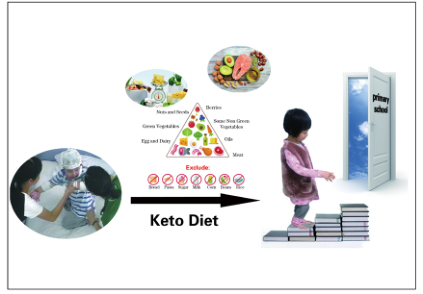Ketogenic Diet in Epilepsy and Associated Comorbidities: Clinical Efficacy and Mechanisms(述評)
2019-04-26 14:04 作者:三博腦科醫(yī)院
Epilepsy is a disorder of the brain characterized by an enduring
predisposition to generate epileptic seizures and by the associated
comorbidities such as neurobiologic, cognitive, psychological, and social
consequences of this condition. Up to 30 percent of patients with epilepsy is
pharmacoresistant, and apart from those who are candidates for resective
surgery, most will continue to have disabling seizures and a wide range of
cognitive and psychiatric symptoms. Recurrent seizures and comorbidities in
epilepsy impair patients’ health-related quality of life. Comorbidities and
epilepsy have a bidirectional relationship, sharing common underlying
pathogenesis. Until now, no conventional antiepileptic drugs commonly used is
proven to provide the solid role in prevention of epileptogenesis or epilepsy
related comorbidities. Therefore, it is critical to develop the novel drugs with
the potential to benefit patients with pharmacoresistant.
The ketogenic diet has seen a revival in its clinical use in the past decade and demonstrates its effectiveness in ameliorating both seizures and cognitive concerns for the patients with pharmaocresistant epilepsy, which has motivated novel research studies into the mechanism of the ketogenic diet. Recent experimental studies also indicate that the ketogenic diet is a promising disease-modifying therapy for epilepsy. Therefore, the mechanisms underlying its anticonvulsive effects differ from those targeted by the current antiepileptic drugs. Despite the mechanisms underlying the ketogenic diet is still overall unclear, there is increasing evidence that the ketogenic diet likely involve a combination of multiple mechanisms to inhibit seizures, postpone disease progression as well as attenuate the epilepsy associated comorbidities.
In the Research Topic we wish to cover, but are not limited to, the following: i) epigenetic mechanism of the ketogenic diet; ii) ketogenic diet and AMPA receptors (glutamate receptors); iii) ketogenic diet and epileptogenesis; iv) ketogenic diet and adenosine system; v) ketogenic diet and comorbidities associated epilepsy; vi) ketogenic diet and sudden unexpected death in epilepsy (SUDEP)
Contributors are encouraged to submit original submissions in basic science and clinical investigations which have the potential to significantly advance the field. In addition to original research papers, we welcome the review articles covering novel insights into mechanisms mobilized by ketogenic diet therapies. All papers contributed to the field will be subjected to strict peer review.
Keywords: Epilepsy, comorbididites, Ketogenic diet, epileptogenesis, mechanism
Important Note: All contributions to this Research Topic must be within the scope of the section and journal to which they are submitted, as defined in their mission statements. Frontiers reserves the right to guide an out-of-scope manuscript to a more suitable section or journal at any stage of peer review.

The ketogenic diet could inhibit seizure and improve the quality of life in patients with epilepsy
Epilepsy is a devastating neurological disorder characterized by an enduring predisposition to generate epileptic seizures and by the associated comorbidities such as neurobiologic, cognitive, psychological, and social consequences of this condition. In approximately 30 percent of patients with epilepsy, the current conventional antiepileptic drugs fail to control seizures.
The ketogenic diet, the high-fat, low-carbohydrate composition is an alternative metabolic therapy for epilepsy, especially for children with refractory epilepsy. Recently clinical and experimental results demonstrate its effectiveness in ameliorating both seizures and cognitive/ psychiatric concerns for the patients with refractory epilepsy. Of importance, ketogenic diet demonstrates to be a promising disease-modifying therapy for epilepsy.
The kid (left in the figure) with recurrent seizures and learning problems causes difficulty in school. After ketogenic diet therapy, the kid (right in the figure) got seizure-free, and could study well and enjoy a happy life at primary school.




 京公網(wǎng)安備 11010802035500號
京公網(wǎng)安備 11010802035500號